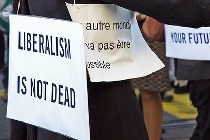Pratap Bhanu Mehta
PRESIDENT, CENTRE FOR POLICY RESEARCH, NEW DELHI
Pratap Bhanu Mehta is President, Center for Policy Research, New Delhi. He was previously Visiting Professor of Government at Harvard University; Associate Professor of Government and of Social Studies at Harvard. He was also Professor of Philosophy and of Law and Governance at Jawaharlal Nehru University. He was also been a Visiting Professor at NYU Law School. His areas of research include, political theory, constitutional law, society and politics in India, governance and political economy and international affairs. He has a B.A. First Class in Philosophy, Politics and Economics from Oxford University (St. John's College); and a Ph.D in Politics from Princeton University. He is the recipient of the Malcom S. Adishehshiah Award for 2010 and of the 2011 Infosys Prize for Social Sciences - Political Science.
He has also done extensive public policy work. He is a member of the National Security Advisory Board, Government of India. He was Member-Convenor of the Prime Minister of India’s National Knowledge Commission; Member of the Supreme Court appointed committee on elections in Indian Universities and has authored a number of papers and reports for leading Government of India and International Agencies, including the World Bank, UNRISD, DFID. He has been involved with several institutions of Higher Education. He is on the Board of Governors of International Development Research Council (IDRC), and numerous other academic institutions, including National Institute of Finance and Public Policy. He is also a member of the WEF's Global Governance Council.
Disclaimer: External experts are not affiliated with Gateway House and have been presented here for reference only.
Expertise
Democracy, Indian Foreign Policy, Nationalism
Last modified: July 28, 2017
Recent projects
 Courtesy: Ronnie Hall/Flickr
Courtesy: Ronnie Hall/Flickr
Liberalism is a politics of hope, mutuality, compromise and reason. If that has been replaced by a politics of fear, egotism, polarisation and unreason, it is India’s elites that are responsible. How can liberalism be made an object of mass politics in India?



